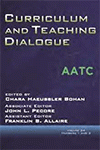
Curriculum and Teaching Dialogue
Volume 24, Numbers 1 & 2, 2022
Edited by:
Chara Haeussler Bohan, Georgia State University
John L. Pecore, University of West Florida
Franklin S. Allaire, University of Houston-Downtown
A volume in the series: Curriculum & Teaching Dialogue. Editor(s): Chara Haeussler Bohan, Georgia State University. John L. Pecore, University of West Florida. Franklin S. Allaire, University of Houston-Downtown.
Published 2022
Curriculum and Teaching Dialogue is a peer-reviewed journal sponsored by the American Association for Teaching and Curriculum (AATC). The purpose of the journal is to promote the scholarly study of teaching and curriculum. The aim is to provide readers with knowledge and strategies of teaching and curriculum that can be used in educational settings. The journal is published annually in two volumes and includes traditional research papers, conceptual essays, as well as research outtakes and book reviews. Publication in CTD is always free to authors. Information about the journal is located on the AATC website http://aatchome.org/ and can be found on the Journal tab athttp://aatchome.org/about-ctd-journal/.
CONTENTS
Acknowledgments. 2021 KEYNOTE ADDRESS: The Politics of Creativity: We Have Seen the Muses and They Are Us, Kate Kauper. VOLUME 24, NUMBER 1: AATC 2021 Keynote Address — Moments of Inspiration: The Teacher’s Muse, Sam M. Intrator. Editorial Remarks—42 Reasons to be Concerned About the Status of Curriculum and Teaching, Chara Haeussler Bohan. Crossing Cultural Borders and Expectations of Schooling: Learning From Immigrant Families, Mary Adu-Gyamfi and Antonio J. Castro. A Pedagogy of Imagination: Riffing on Reality and the Politics of Disimagination, Barth A. Quenzer. Othered Forms of Knowledge: Combining Theories of Aristotle and Bourdieu to Explore Intellectual Capital in the Curriculum, Toni Bailey. Teaching Beyond Racialized National Fantasies for Anti-Racist Curriculum: A Portrait of a High School Civics Course, Mark Helmsing. Perceptions of a Developing Teacher Leader Through the Lens of Freire, Corey E. Nagle. Immersion of High-Impact Practices: Emerging a Stronger Educational Leadership Program, Aneta Walker and Julie Gray. VOLUME 24, NUMBER 2: AATC 2021 Keynote Address—Science Learning and the Creative Process, Gregory Cajete. Editorial Remarks: Creativity in Teaching, John L. Pecore. “We’re Still Here”: An Institutional Critique, Juria C. Wiechmann, Blake McCullough, Ian M. Clemente, Alex DeCoteau, Daniel Henry, Annette Mennem, Daniel R. Conn, and Nathan C. Anderson. Living Truthfully in Classroom Circumstances: Responding to Moments of Uncertainty in Teaching and Acting, Aaron Zimmerman, Chrissy Eubank, Elizabeth Goldberg, Emily Lahr, Stacey Sneed, and Stephanie Welch. A Guiding Framework for Teacher Formation: Integrating Best and Deep Practices, Paul Michalec and Katherine Newburgh. Head Above Water: A Study of K–12 Teachers’ Perspectives on Emergency Remote Learning During the COVID-19 Pandemic, Jami C. Friedrich and Katherine A. Perrotta. Lived Experiences of Dual Major Teacher Candidates Completing the Special Education edTPA About Mathematics, Katherine Baker and Danielle Lane. Investigating and Interrogating: Rethinking Statistics Curriculum for Preservice Teachers, Susan O. Cannon. OUTTAKES: Intentional Changes, Unintended Advantages: Adjusting Research Approaches During the Pandemic, Erin Bronstein. Hand in Hand or Head in Hand: A Wilde Discovery, Jeffrey Connelly. Emergent Scholarly Identity: Found and Cherished, Dina Geumei and Denise McDonald. Curriculum Design Research as a Learning Experience and a Teachable Moment, Jerry L. Parker. Trust the Teachers! Conducting School-Based Research in a Rural Middle School When Building Relationships Face-to-Face Is Not Possible, Khushbu Singh, Emily Sidnam-Mauch, Shahan M. Iqbal, Oluwafemi Osho, Sushmita Khan, Philip Nelson, Kyra Derrick, Kelly Caine, Bart P. Knijnenburg, and Nicole Bannister. I Hope You Get Deported: An Immigrant Child’s Perspective, Laura Zucca-Scott. BOOK REVIEWS: Syllabus: The Remarkable, Unremarkable Document That Challenges Everything by William Germano and Kit Nicholls, Reviewed by L. Brook Buckelew. Voices of Social Education: A Pedagogy of Change by Bernardo E. Pohl,Jr., Cameron White, and Christine Beaudry, Reviewed by Katherine A. Perrotta. Cynical Theories: How Activist Scholarship Made Everything About Race, Gender, and Identity and Why This Harms Everybody by Helen Pluckrose and James Lindsay, Reviewed by Mark Felts. Unraveling the Assessment Industrial Complex: Understanding How Testing Perpetuates Inequity and Injustice in America by Michelle Tenam-Zemach, Daniel R. Conn, and Paul T. Parkison, Reviewed by Mya Martin-Glenn. Liberating Learning: Educational Change as Social Movement by Santiago Rinco n Gallardo, Reviewed by Paul Parkison, Michelle Tenam-Zemach, and Daniel R. Conn. Critical Storytelling During the COVID-19 Pandemic: Berea College Students Share Their Experiences by Nicholas D. Hartlep, Christopher V. Stuchell, Nathaniel Elisha Whitt, and Brandon O. Hensley. Reviewed by Bernardo E. Pohl. Letting Go of Literary Whiteness: Antiracist Literature Instruction for White Students by Carlin Borsheim-Black and Sophia Tatiana Sarigianides. Reviewed by Caroline Smith. About the Authors.
-
Paperback979-8-88730-048-1
Web price: $45.04 (Reg. 52.99)
-
Hardcover979-8-88730-049-8
Web price: $80.74 (Reg. 94.99)
- eBook979-8-88730-050-4

- EDU007000 - EDUCATION: Curricula
- EDU037000 - EDUCATION: Research
- EDU046000 - EDUCATION: Professional Development
-
 Curriculum and Teaching Dialogue
Vol. 23 # 1 & 2
Curriculum and Teaching Dialogue
Vol. 23 # 1 & 2
-
 Curriculum and Teaching Dialogue
Volume 25, Numbers 1 & 2, 2023
Curriculum and Teaching Dialogue
Volume 25, Numbers 1 & 2, 2023
-
 Curriculum and Teaching Dialogue
Vol. 18 # 1 & 2
Curriculum and Teaching Dialogue
Vol. 18 # 1 & 2
-
 Curriculum and Teaching Dialogue
Vol. 19 # 1 & 2
Curriculum and Teaching Dialogue
Vol. 19 # 1 & 2
-
 Curriculum and Teaching Dialogue
Vol. 20 # 1 & 2
Curriculum and Teaching Dialogue
Vol. 20 # 1 & 2
-
 Curriculum and Teaching Dialogue
Vol. 21 # 1 & 2
Curriculum and Teaching Dialogue
Vol. 21 # 1 & 2
-
 Curriculum and Teaching Dialogue
Vol. 22 # 1 & 2
Curriculum and Teaching Dialogue
Vol. 22 # 1 & 2

